Hop Press
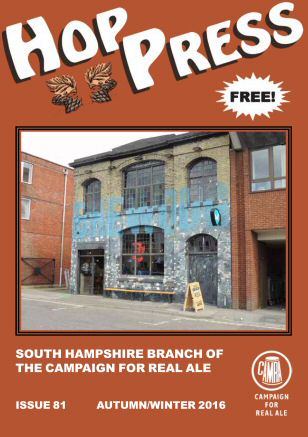
Issue 81 – Autumn 2016
View pdf version 2MB download
Go to Previous Hop Press Browse for another Hop Press
Go to Next Hop Press
Contents
- Editorial
- Pub News
- The Cask Report 2017
- Craft, The Devil's Work
- Home-grown Chasers
- A Seven Pint Service
- Whatever happened to…
- Competition Crossword
- 2017 Good Beer Guide
This summer saw the successful completion of our twentieth annual Southampton Beer Festival at the city’s Guildhall. Just under 3000 people attended and enjoyed some 100 different brews.
Voted on by the attendees, the Beer of the Festival was Oat and Coffee Stout from Lymington’s Vibrant Forest Brewery and the lower gravity (under 4.5%) favourite beer was Bowman Brewery’s elderflower summer refresher Eldorado. Cider or Perry of the Festival was Hampshire’s Midnight Special Perry from Mr Whitehead of Alton. Donations of unused beer tokens by the customers raised just over £1000 for the Forget-me-nots local charity, thank you all!
Now, in the coming year, we are looking to make an exciting change:
Southampton’s 2017 beer festival will, we hope, be held at the St Mary’s Stadium. Using the large space
below the stand gives us an opportunity for a more flexible bar layout, more seating and an easier
accommodation of the food and entertainment areas. The same wide range of local and national real ales will
be provided; plans are still as yet in the early stages, look out for more details as we approach summer
2017.
Below is a simple logo, but it is indicative of remarkably speedy activity in the Hampshire business community. In August the long-established (sixteen years) Oakleaf Brewery, in Gosport, suddenly and unexpectedly went into receivership; a doleful event that this editorial had been expecting to cover. But, within a month the hoped-for white knight had arrived in the shape of a locally-based investment and ‘solutions’ company Just Develop It.

Just Develop It have acquired the site and equipment of Oakleaf and, retaining the services of Ed Anderson the head brewer, have already restarted brewing under the banner of the Fallen Acorn Brewery.
The official notice of this was issued on September 12 with the first two beers being listed as the 4.7%
Hole Hearted (a multi-award winning brew from the original Oakleaf stable) and a new, powerful 5.5% IPA
called Expedition. Further varieties are expected to appear shortly.
www.fallenacornbrewing.co.uk
![]()
Our last edition of Hop Press had the news that the Royal Oak at Fritham, deep in the New Forest, was the branch’s ‘Pub of the Year’ choice for this year. As a result it went forward with ten others from Hampshire, Wiltshire, Dorset, the Isle of Wight and the Channel Islands towards becoming the Wessex regional winner – part of the journey towards the national title.
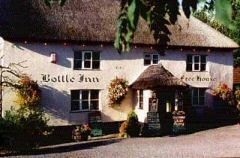
Bottle Inn, Marshwood, Dorset
Unfortunately the Royal Oak did not come out top with the group of travelling judges, their votes went to
an equally rural inn in the far west of Dorset, the Bottle Inn at Marshwood. The press
release covering this level of the contest describes the Bottle as: “Idyllic pub situated on the
Dorset/Devon border with a single bar serving two small rooms. Family room and skittle alley at the rear.
leading to a large garden overlooking Marshwood Vale. Apart from pork pies no regular meals are served
except on Fridays which is Curry Night. Up to six changing ales, sourced locally and nationally are served
plus six ciders. Nettle eating contest in July. Sports TV, but in separate back bar.”
Our front cover for this edition may have surprised some readers, it shows the newly opened (mid-September) BrewDog pub in Southampton.
This famous (some might say notorious, even infamous) company has had untold battles with various regulatory bodies – all by way of publicising the brand; won them all and grown mightily as a result. They have crossed swords with the Advertising Standards Authority over their use of obscenities in press releases, with weights and measures bureaucrats over selling beer in 2/3 pint measures and with the Portman Group over their on-going campaign to be the brewers of the world’s strongest beer.
Starting in 2007 as a tiny, two man, microbrewery in the unlikely area of Aberdeen they have grown explosively and now have some fifty bars, worldwide from Scandinavia through South America to Hong Kong, over 500 employees plus a major new brewery; and now Hampshire…

The BrewDog's beer dispensers
However, readers’ surprise at seeing the cover would have been more properly due to there being no true real ale at all on offer at this new shrine to craft beer! The picture left shows just some of the nineteen draught beer dispensers, offering brews ranging from one at 0.5% abv (!) to another at 13.8% (!!) and all points between. Not all are Scottish, the Brewdog beer list also features some guest beers from around the world. For example in the opening week these included a Belgian 2.5% fruit beer, an 8.7% American Imperial Russian stout/Moka coffee blend from San Diego and a 12.5% barley wine from Kentucky.
With this innovation, with yet more micropubs adding to those we featured in the last issue and with more
new breweries immanent, the beer drinker’s range of choice in the city is expanding enormously.
The continuing saga of the gigantic takeover battle between the global beer behemoths, US based AB InBev and UK based SABMiller is reaching its conclusion with the SABMiller shareholders agreeing the deal at the start of October; the deal should be complete before the end of the month.
AB InBev, formerly Anheuser-Busch, the makers of Budweiser, Stella Artois, Corona, Becks and Leffe amongst many other international beer brands are to pay the unimaginable sum of £79 billion for SABMiller. SABMiller started in South Africa as the Castle Lager Brewery but expanded throughout Africa and into Europe and beyond, now controlling such well-known brands as Fosters, Grolsch, Peroni, Pilsner Urquell and of course USA brands Coors and Millers.
The deal will give the resulting AB InBev (who will retain that name) a strong presence on every continent and they will be responsible for almost one in every three pints consumed world-wide.
Parochially, and perhaps quite surprisingly, it is not likely that this deal will make much impact or
detectable difference to any of our pubs, since neither of these giants actually own any in the UK.
Pubs are no longer the places to drink beer – a startling statement resulting from statistics just produced and published by the British Beer and Pub Association (BBPA). After a trend that has been seen for several decades, the volume of beer sold in the off-trade, principally supermarkets, finally exceeded that sold in pubs by late 2014.
To appreciate the extent of the change in national habits that this represents it is enough to notice that in 1980 pubs sold 88% of the nation’s beer. However, the rate of change has itself been decreasing and many commentators confidently predict that off-sales will finally peak before reaching 60%.
Many factors are advanced to account for the decline with cost difference, and its own continuing increase, being the most obvious. In 2014 the average supermarket price, with their heavy discounting, fell to just one third of the over-the-bar pub price! Perhaps a more dramatic example is that in a decade or so when inflation rose by 50%, pub prices went up 58% but supermarket beer by just 6%.
Very much on the bright side of what is somewhat a tale of woe, is cask beer − real ale – which,
practically speaking, can only be enjoyed in the pub is booming compared to all other draught styles.
Finally, after global and then national news items a local snippet, from just over our branch border into the reaches of CAMRA’s North Hampshire Branch at Stockbridge.
The Greyhound will be hosting a very prestigious supper evening on Thursday, December 8; in charge of the meal will be TV celebrity and double Michelin starred chef Tom Kerridge.
The supper night is one of several charity events at the Greyhound where all the proceeds will go to a
trust fund, the Alex Lewis Trust. This was set up to support Alex who is the partner of the Greyhound’s
owner, Lucy Townsend, and having fallen victim to disabling illness, now needs funds for wheelchairs,
prosthetics and many life enhancing building improvements.
Rob Whatley

Red Lion, Bitterne - as it was
Southampton: Bitterne
We mentioned in the last edition that the Red Lion in Bitterne had closed. New owners JD Wetherspoon have announced that it is due to reopen on 7 March next year following a £1.6 revamp, including a three storey rear extension. The pub, which will retain its current name, was purchased for £650,000.
There is also a totally new outlet in Kemps Quay, Quayside Road. Bar Marina opened in September. Up to four real ales, served by gravity dispense, are available.
The Bittern reopened in June after a £460,000 refurbishment. The work included new
décor, improvements to the toilets and kitchen and a new children’s play area.
Southampton: Bitterne Park
We are pleased to report that the Bitterne Park Hotel is now open again after being closed
for a couple of months. The Enterprise Inns pub is now being run by Krista Campbell who has previously
worked in a number of pubs in the area.
Southampton: Woolston
Staying on the east of the Itchen, as forecast in the last edition, Olaf’s Tun Craft Ale
Bar opened at the beginning of August in a former shop in Portsmouth Road, Woolston. The compact
bar has a scaffold-built stillage for the real ales with the kegs squeezed alongside or underneath, with
the keg taps mounted on a wooden board at the end. One side of the pub has high bench seating with cask
storage below. The front of the pub has a couple of low tables and up a ramp to the rear is another one.
Total capacity is about 30 people. A constantly changing selection of four real ales is available. The name
Olaf’s Tun was the original pre-Norman name for Woolston.
Southampton: Oxford Street

Caskaway Tasting Rooms
Another new micropub has opened in a former florists in Oxford Street. Caskaway Tasting
Rooms opened at the end of August. There is bench seating alongside each wall, with cask and other
storage beneath. A wooden stillage at the end has room for 8 casks. There's no bar counter so service is at
your table. Decoration has a nautical theme with ropes, lights, flags and life-preserving rings. There are
outside drinking areas at both the front and back of the premises.
Southampton: City Centre
At the time of writing it appears that Quayside in West Quay Road is about to reopen after years of closure.
The third of the Mettrick’s café-bars opened in Guildhall Place in May and this one includes two handpumps that offer a changing choice of local beers. Not a 'pub' by normal definitions, indeed the emphasis is on good quality tea, coffee and food. However, it is good to see that the owners recognise that customers attracted by these offerings are also likely to appreciate good beer.
A few yards away, in Above Bar, another café-bar to be called Belgium and Blues is due to open in October. This is an independently owned bar and brasserie selling some fifty Belgian and sixteen British craft beers, artisanal spirits and an extensive list of wines. The brasserie will be Belgian inspired with freshly baked pastries, open sandwiches, moules and fries (of course) and specialities such as marinated ribs. The bar, with two areas: a ground floor bar and a cellar bar which will also feature the live music, will be owned and run by a triumvirate of Mr. Steve Lee (former landlord of the Filley Inn, Setley), Mr. Jack Glennie (former manager of the Foresters Arms, Brockenhurst) and Mr. Alan Williams (former chef at the Wykeham Arms, Winchester) – a wealth of experience in the licensed trade!
Continuing north into London Road, Chalk Valley has been a burger restaurant for a few years but in August it expanded into the next door unit and added a bar. The left side remains essentially a café/restaurant which concentrates on serving food; the right side, while still having restaurant tables, also has lounge chairs and coffee tables and has the bar. On the bar four handpumps serve real ale and cider while a line of keg fonts on the back wall serve a range of ‘key-keg’ beers.

The pallet bar at BrewDog
As shown on our cover photograph, and mentioned in the Editorial, in Upper Banister Street the new
BrewDog outlet has opened in the former Coco Rio restaurant. In the opening week the
nineteen draught beers on offer were all keg style but there may be the occasional cask offering available
(though still, presumably, served by gas pressure). As the picture shows, the décor is savagely in the
‘shabby-chic’ vogue – the bar front for example is simply some spare pallets (artistically) nailed
together and then nicely lit from behind, whilst the flooring in front of the bar uses industrial metal
decking plates.
Southampton: Shirley
A pub that opened last December has been successful in its application for longer opening hours. The
Overdraft micropub in Shirley Road is now able to open from noon each day and can stay
open until 11pm or midnight depending on the day of the week.
Southampton: Bevois Valley
We mentioned in the last edition that Dungeon and Xcalibar had reopened.
However, no sooner had we gone to press than it was announced that owners Sue Rositer and Tony Court had
decided to call time on the club that they had run for 27 years. A little further along the road, landlord
Colin Pollard left the Shooting Star in July after seven and a half years at the pub. It
is still open under new management.
Southampton: Portswood
Onto Portswood where we hope that by the time that this is published the Tramstop Bar & Kitchen will be open in the former GP surgery in Portswood Road (Immediately opposite the Trago Lounge). The published opening day for this, the city’s newest micropub, was Saturday, September 24 but this slipped into early October because of an overrun in completing the electrical wiring.
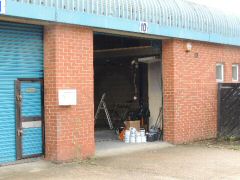
Unity Brewing
The city will also shortly have a new brewing company, Unity Brewing Company. Unity
Brewing is being established as a six-barrel enterprise in upper Portswood and will specialise in a fusion
of Belgian and north eastern American craft style beers; its owner and head brewer is Jimmy Hatherley, a
one-time brewer at both the Flack Manor and Red Cat breweries. The brewery itself is also intended to have
a taproom bar incorporated, and will be in unit 10 on the small Belgrave Industrial Estate between
Portswood Road and Thomas Lewis Way. Their website is already in place: www.unitybrewingco.com
Our somewhat uninformative picture shows the conversion work underway as of October First.
Southampton: St Denys
In St Denys there is news from Greene King’s Junction Inn at the end of Adelaide road.
Landlady Dawn Fildes will be leaving on November 6 and moving to northern Hampshire for a well-earned break
from the licensed trade. John and Pat Green, currently at the Richmond in Portswood, will be taking over.
We wish Dawn well. The Junction is, by the way, now another of our pubs with the ACV (Asset of Community
Value) status.
Southampton: Highfield
Yet another application for a new micropub has been made for what is currently a shop in Burgess Road,
close to Bealing Close. No other details yet.
Southampton: Redbridge
In the far west of the city, an application has been submitted to provide a covered area in the rear garden
of the Ship Inn, Old Redbridge Road.
Adnac Park

Walnut Tree Farm
Just across the city boundary into Test Valley, the new Greene King food orientated outlet in Adnac Park
that we have mentioned in previous editions is now open as Walnut Tree Farm.
North Baddesley
The £150,000 refurbishment at the Bede’s Lea in North Baddesley was so successful that
it was shortlisted in the Best Turnaround category at the 2016 Great British Pub Awards.
Romsey
Permission has been granted for the re-roofing of the Grade II listed Cromwell Arms, the Fullers gastro-pub at the western end of the Romsey bypass.
Undoubtedly the big news in Romsey is that the William IV, at the top of Latimer Street, at one time effectively the ‘Strong’s Brewery Tap’ but currently closed, is due to resurface, transformed, as the Tipsy Pig Craft Alehouse and Delicatessen. The opening is expected to be towards the end of October, Facebook/Twitter/Instagram users will be the first to know – these channels are preferred to an old-hat website! In addition to featuring many craft beers and specialising in charcuterie based foods there is also a plan to have an on-site brewing operation and, as in other recent new ventures, production of Belgian style beers has been mooted.
For many years Strongs Brewery was a dominant influence in the town. Since the closure most of the site has
been designated for housing. However there is still a big void and now hundreds of people have signed a
petition urging the government to change the law so that more pressure can be brought to bear on the owners
of such brownfield sites who delay much-needed development.
Timsbury
To the north of Romsey, owners Fullers have been given permission to add 14 guest rooms to the Bear
and Ragged Staff at Timsbury.
Winchester
Another Fullers pub, the William Walker, in the Square, Winchester, underwent an extensive refurbishment during the summer, costing £500,000. The pub is almost unrecognisable from its previous appearance and now includes a new upstairs dining area.
Also open again is the Westgate Hotel, which is run by the City Pub Company, which also runs Alfie’s in the High Street. There is a good range of local real ales plus beer from the newly resurrected Truman Brewery. The £800,000 work also included the addition of 10 guest rooms.
Permission for somewhat less dramatic changes has been lodged by the owners of the Royal
Oak, Greene King. They include internal alterations, such as the removal of a fire place and the
replacement of external signage. The owners of the Slug and Lettuce have also requested
permission to replace external signage.
Compton
Planning permission to build a nursing home on the site of the former Captain Barnard, which we mentioned
in the last edition [and a number of editions before that! – Ed.], has at last been granted.
There will be 40 single rooms and 11 double rooms.
Lower Upham
The post office in Lower Upham has a new location. The previous shop closed in May 2015 but its function
has now moved just along the road to the Alma Inn. The postmaster from Bishop’s Waltham
will visit the Alma on Mondays and Thursdays.
Eastleigh
The Litten Tree in Eastleigh has now reopened as the Station. It has an airier feel than
before as a result of the £300,000 refurbishment. There are four hand pumps serving a mix of national and
local brands. Although only two of the handpumps have been operating on our two visits so far it is much
better to adjust beer availability to keep up quality rather than have too many beers with a slow
turnover.
Horton Heath
Permission has been sought to add 19 new car park spaces at the Brigadier Gerard, Horton
Heath.
Fordingbridge (Ashford)

Augustus John
The car park of the Augustus John just outside Fording bridge in Ashford has also been the
focus of attention in recent weeks, but for very different reasons. An appeal has been lodged against the
refusal by New Forest planners to grant permission for two flats to be built in the car park. Both the current
licensee, Bryan Greenwood and the Town Council have objected to the plans.
Damerham
A little to the west in Damerham, permission has been granted for the use of stables as a workshop on land
to the rear of the Compass Inn.
Brook
Permission has also been sought to build a two storey office block behind the Bell Inn and Bramshaw Golf Club. It would house the staff of Brook Enterprises, who have got to move out of their current offices.
The Green Dragon, directly opposite, was some time ago acquired by Wadworth but this
missed being reported here.
Hardley
An application has been submitted to use an outbuilding as guest accommodation at the Forest
Home, Hardley.
Lymington
The Mayflower reopened at the end of April after a substantial refurbishment. There has
been a flurry of planning applications for external signage for the White Hart at
Pennington, some of it retrospective. July saw the launch of the Shipyard Bar and Kitchen
(and an adjoining fish shop). It is located in Bath Road. Not a new outlet but a new name for an old one in
Walhampton. The Waggon and Horses is now called the Ferryman.
New Milton
New River Retail, who are behind the planning application at the Augustus John in Fordingbridge, mentioned
above, have also applied for permission to build a shop on part of the site of the Wheatsheaf
Hotel, New Milton. A store buildings and some small buildings to the rear of the pub would be
demolished but the pub/hotel would remain largely as it is, although with much reduced parking.
Milford-on-Sea
Earlier on in Pub News we mentioned the many new micropubs in Southampton. Now we are pleased to
report that attempts are also being made to provide such outlets to the citizens of the New Forest. An
application has been submitted to re-open 27 High St., Milford-on-Sea (a disused launderette) as a ‘craft
beer bar.’ The planners’ decision is not yet available.
The Cask Report 2017 Hop Press
index
In September the tenth annual Cask Ale Report was published, revealing that this sector of the pub trade continues to grow strongly and is now worth a total of £1.7 billion.
The first edition, in 2007, showed that cask beer was only on offer in a minority, less than half, of British pubs but now in 2016 it is almost the norm, with three-quarters able to satisfy a real ale drinker’s demands.
The Cask Report this year has a new compiler, Sophie Atherton, and her key message to licensees throughout the document is the need to be well informed, to keep up with an increasingly knowledgeable drinking public. The report’s surveying showed that where the bar staff engaged in conversation with the customers about the cask ales, then these customers were more likely to order another cask beer and more likely to revisit the pub. However, Sophie also found that many pubs were still missing a chance, as in only a third did the staff spontaneously initiate such conversation.
Perhaps worse were the statistics of staff knowledge; only a little over a third of the customers who were asked about conversations with bar staff were satisfied that the staff were knowledgeable enough about the beers they were serving, 12% thought the staff knew little or nothing! As mentioned such informative conversations are a key factor in keeping and increasing trade so staff as silent robots are no longer acceptable.
A statistic that might be little deflating to some licensees is that drinkers trusted brewers to be far more knowledgeable about beer than landlords by a factor of five to one.
Some key findings stand out: Offering ‘tasters’ unquestionably provokes more sales as does offering comprehensive notes on the beers on sale, especially clearly showing the ABVs and the colours. A rather surprising finding is that where pubs feature the ‘craft’ word in their marketing they increase the cask sales – 57% of real ale drinkers are more likely to visit pubs prominently using ‘craft’ descriptions even though they are only going to drink the cask beer. In this respect ‘craft marketing’ can be seen as in intro to cask drinking!
Another factor that comes through strongly is the absolute requirement for cask beer to be served at peak quality; quality before quantity – a number of ales served perfectly is always preferable to a huge array in indifferent state due to slow turnover. A key factor of course is cleanliness and a worrying finding in this report is that a third of the surveyed pubs have or had some problems with glass hygiene.
The point is made that the average cask ale drinker spends £967 per annum in the pub, very nearly double the average for all customers. A statistic that might give any keg-only licensee pause for thought…
The report also links the phenomenal rise of the micropub movement with the robustness of the cask ale
market – none of the well over 200 micropubs now established could exist without their base trade which
is cask ale.
The 40 page report is available for free download from the Cask-Marque website at:
www.cask-marque.co.uk/wp-content/uploads/
Craft, The Devil's Work Hop Press
index
The pages of Hop Press have, in previous issues, had some dealings with that innocuous word ‘craft.’ But we make no apologies for returning to it – the Campaign is currently working itself up into a tizzy over this scrap of basic English. Such a ferment, in fact, that could trigger an earthquake under CAMRA’s very foundations.
The nub of the problem can be described in just a few words:
Now, in 2016, there are some processed keg-style beers that actually taste good; how are we to react to this seeming heresy?
Essentially CAMRA is a quasi-religious cult, preaching the one true creed, ‘Cask is Good’ all other doctrines are false. Thankfully, entirely peaceable, we are though something of an ISIS of the beer world!
Like many innovations, the origins of this dilemma lie across the Atlantic. With no tradition of secondarily fermented cask beer to fall back on, the American smaller brewers reacted to the awful bland products of Milwaukee’s giants by seeking out ever higher quality ingredients – newly bred, hoppier hops, novel malted grain mixtures and, in general, higher alcohol levels.
And, to keep the multi-nationals at bay, they cunningly appropriated the ‘craft beer’ name for these quality beers as applicable only to small producers. A resounding success in the USA, the ‘craft beer movement’ was bound to be noticed here but with some slight but essential elements being lost in transit. With no legal framework limiting producer size the term became just a new buzz-word for the marketeers and many national brewers are using it indiscriminatingly.
However, many small brewers, especially in London and to an extent Manchester, are now brewing very interesting, tasty but quite heretical beers. CAMRA has, as yet, no strategy whatsoever to cope with this. They cannot be recognised within our real ale remit but, clearly are being enjoyed by a sophisticated and knowledgeable beer-drinking public, to ignore or deprecate them questions our self-proclaimed insight into the secrets of the brewery.
This whole point was visited at some length in last autumn’s Hop Press, issue 79, and throughout the year since we have seen an increasingly frenetic roadshow of the Campaign’s great and the good touring the nation, holding some fifty meetings at individual branches, attempting to find some messiah who can square this circle. So far without any obvious cries of ‘eureka!’
The roadshow – CAMRA’S revitalization task force – has until April to produce their answer, in the form of a motion to the 2017 AGM (at the Bournemouth International Centre). If they can, it may well be as bizarre and unlikely as Joseph Smith’s Mormon gold plates!
We are still four years or so away from our golden jubilee but there is quite a feasible possibility that the Campaign will never last to celebrate it if it cannot find itself an acceptable solution to this conundrum.
With 183,000 members surely someone can provide the answer? Any suggestions?
Home-grown Chasers Hop Press index
Rob Whatley
The last few years have seen a proliferation of new breweries throughout the UK and Hampshire is no exception to this trend. Indeed, such is the number of new breweries that a brewery such as Vibrant Forest, which was founded in 2011, may be seen as part of the established ‘old guard.’
Much of this growth has been fuelled by the growing demand from consumers for locally produced products, not only beer but also food. While readers of this publication are likely to be familiar with many of the new local breweries, they may not be so aware of the parallel growth in the production of other alcoholic drinks in the local area.
As with breweries, vineyards have been around for hundreds of years but the 1970s saw an explosion in the establishment of new starts and recent growth means that there are now 42 vineyards in Hampshire, up from 38 in 2015. Many of these vineyards are in our own local area and can be found in locations such as Bishop’s Waltham, Beaulieu, the Test Valley, Alresford, Fordingbridge and Lymington.
More than six million bottles of wine are produced in England each year and in this Hampshire is at the forefront. Local production focuses on sparkling wines as the county’s soil does not seem to suit the production of good quality still white wines.
November 2015 saw 1,400 people attend the second Winchester Wine Festival at the Guildhall. Both local and worldwide wines were on offer, alongside cheese, chocolate and pork pie stalls. All seems rather familiar to visitors to CAMRA’s beer and cider festival at the same venue.
As well as wine festivals, last February also saw the inaugural Winchester Cocktail Week. Similar events have been running in London for a decade. Attendees got a wristband identifier and were then able to sample 16 unique cocktails at one of 13 participating venues across the city. The venues included bars and pubs such as No 5 Bridge Street, the Green Man and the Wykeham Arms. The event is due to return in February next year.
Of course one of the essential ingredients of many cocktails is gin and this can now come with a local flavour for, along with the sprouting of new breweries and vineyards, we have also seen the founding of new distilleries in the local area in recent years. The highest profile of these is the Bombay Sapphire Gin Distillery at Laverstoke Mill, near Whitchurch. It not only produces gin but opened its doors to the public in October 2014. Tastings, tours (we note that Houghton WI were recent visitors), parties and other corporate events are all held at the former Portal's famous bank-note paper mill site. The distillery won the 2016 top gold award in the ‘best small attraction’ class at the VisitEngland awards ceremony this year.
Established in 2014, Winchester Distillery produces the Twisted Nose brand of gin which has local watercress among its ingredients. Founder Paul Bowler has also produced a Hampshire Dry Gin range and produced some 10,000 bottles in 2015. The distillery is currently moving into new premises in the heart of the watercress beds between Winchester and Alresford. They have also expanded their range to include a dry vermouth using a local wine from a vineyard at Danebury and a Vodka blend with the unusual inclusion of Hampshire grown wasabi (Japanese horseradish).
To the north east, and just outside our area, Gorilla Spirits Company has opened in Four Marks and is based in the same group of industrial units as the well-known Triple fff Brewery. It was first conceived in 2010 and another five years went by before Silverback Gin was launched just before Christmas 2015. Owners Andy and Claire Daniels still both hold down full time jobs but this hasn’t stopped them winning prizes for their gin. It is curious to note that the Silverback Gin has been selected by Southampton Football Club as their ‘premium gin of choice’ for 2016/17, what this implies for the end-of-season league position is anyone’s guess!
We began by comparing the growth in the number of breweries with that of other alcoholic drink producers.
In Lower Pennington Lane, Lymington there is a business that combines both brewing and distilling. Richard
Baker not only brews (excellent) beer in the Dancing Cows Brewery and Distillery at
Saddlers Farm but also produces Lymington Gin. From what seems a traditional dry gin spice mix including
juniper, coriander, orris root and so on, this spirit then deviates a little to take in an infusion of East
Kent Goldings hops to give it its unique nose. Dancing Cows are also starting to produce other spirits;
earlier in the summer they started an apple vodka and they are also toying with the thoughts of a young
whisky style spirit although regulations will probably forbid the use of that word.
A Seven Pint Service Hop Press index
David Etheridge
First Bus ‘City Red’ service 7 from Southampton City Centre to Townhill Park passes close by a number of the city’s Good Beer Guide pubs and three of Southampton’s new micropubs. The service operates up to every seven minutes Monday to Friday, up to every eight minutes on Saturdays and every fifteen minutes on a Sunday. The evening service after 8pm is hourly with the last round trip from the City Centre at 23.10 Monday to Saturday and 22.10 on a Sunday. A round trip City Centre to City Centre takes between fifty minutes and an hour.

Giddy Bridge
The service departs from stop ‘CE’ in Pound Tree Road. If you alight at the third stop, the Cenotaph (3 minutes from City Centre), and walk north across the traffic lights into London Road, on the right is the Giddy Bridge, a Wetherspoon pub, offering eight changing beers. An unusual feature, for nice days, is the quiet roof garden overlooking the busy street scene.

Rockstone
Return to the Cenotaph stop and catch the next No 7 to the Denzil Avenue stop in Bevois Valley (7 minutes
from City Centre). This is close to the imposing Rockstone free house which serves seven changing beers and
one or more real ciders. It is renowned for its generously portioned, home cooked food, with the burgers a
speciality.

Guide Dog
Leaving the Rockstone walk north up Bevois Valley and take the second on the left, Earls Road, and one
hundred metres up on the right you reach the Guide Dog a welcoming street corner local free house serving
eight changing beers. Over the years the Guide Dog has featured several times as the local CAMRA Branch’s
annual ‘Pub of the Year.’

Bookshop Alehouse
From the Guide Dog take Ancaster Road alongside the pub back to Bevois Valley and the bus stop opposite the Aldi Store. You can either wait for a No 7 to travel to the next stop at Spring Crescent (10 minutes from City Centre) and walk 100 metres back to the Bookshop Alehouse or to inject a little gentle exercise it is just a 400 metre walk up Portswood Road from the Aldi Store stop.
The Bookshop is, just as it says on the tin, a micropub in an old bookshop. Serving four changing beers (almost always from small breweries) and still selling any of the books on the remaining shelves.
Return to the Spring Crescent stop and now take the next bus to Portswood Broadway (14 minutes from City
Centre) and you will then be opposite the Tramstop Bar a new pub only just opened at the beginning of
October. The beer range is unknown at time of writing but six handpumps have been fitted… Unfortunately
we are still awaiting a decent picture of the finished building.

The Dolphin
The No 7 now turns east towards the river at Cobden bridge and at the first stop, Belmont Road (15 minutes
from City Centre), a little side excursion is available. Cross the road and walk down the pathway between
the garage and Portswood’s bypass (Thomas Lewis Way) and you will be on Osborne Road; 400 metres down on
the left is the Dolphin serving seven changing beers and real cider. Live music is a frequent feature at
the Dolphin.

South Western Arms
After leaving the Dolphin cross the railway via the footbridge which is adjacent to the pub, this crosses
St Denys Station as well and at the other end of the bridge you will find the South Western Arms which also
serves at least seven changing beers, with a cider and has a walled garden where you can sit in the sun and
listen to the trains passing by.

Junction Inn
From the South Western Arms you can turn left and walk the 400 metres up Adelaide Road to the bus stop on
St Denys Road at St Denys Church or, if you turn right, it is only 100 metres to the Junction a Greene King
‘Local Hero’ pub serving eight beers, four from the Greene King list and four sourced locally The
Junction has a fine historic interior with an impressive bar back and screens.

Butcher's Hook
Back on St Denys Road by the church it is two stops across Cobden Bridge to Bitterne Park Triangle (18
minutes from the City Centre). Here, close to the clock tower, you will find the Butchers Hook
Southampton’s first micropub. four changing beers served by gravity are available in this small bar.
Please note the Butchers Hook is not open on Mondays or Tuesdays and does not open until 6pm on Wednesdays
and Thursdays and 4pm on Fridays.

Hop Inn
From the Butchers Hook, returning to the bus stop at Bitterne Park Triangle, the No ‘7’ takes four stops to reach the Hop Inn, (22 minutes from City Centre). This red brick two bar traditional street corner local serves four beers, normally Bowman Swift One, Flack Manor Double Drop, Sharp’s Doom Bar and Fullers Gales HSB. The return stop to the City Centre from the Hop Inn is just around the corner in Woodmill Lane with the last bus at 23.39 Monday to Saturday and 22.39 on Sundays.
If you wish to complete the full service ‘7’ route the service does a one-way loop through Townhill Park and Midanbury after passing the Hop Inn. There is only one pub on this section of route though, at the Mousehole Lane stop (30 minutes from the City Centre) here you will find the Big Cheese a large Greene King pub serving IPA and Abbot. Until recently there were several others but the Ark (demolished) was lost to housing and the Castle at Midanbury is now a Tesco Express!
For those passengers without a bus pass the ‘7’ operates within First Bus’s Southampton City Zone so
a City Zone Day Ticket at £3.20 is valid on the full service for as many breaks of journey as the
constitution might tolerate!.
Whatever happened to… Hop Press
index
Sitting quietly in the pub recently and contemplating some sixty plus years of enthusiastic pub going, I realised that some – in fact many – features that were so commonplace as to not need remarking upon had now disappeared entirely; gone without comment or note.
For example, a daily pub goer in the 1960s could be sure, during any week or two, to be accosted by a young waif-like girl offering single, red (always, seemingly, red) roses in exchange for some small sum. Presumably these were intended as some form of domestic peace offering for those who had inadvertently spent their wage packet in the pub but I imagine that they rarely worked to that end!
Equally often, on a weekend evening, the public bar (ubiquitous then, another story…) would be stormed by a small raiding party of more matronly, bonneted ladies of the Salvation Army, guaranteeing our salvation from the pages of The Warcry.
And, on the subject of itinerant marketing, when did you last see a white coated seafood vendor with his wicker basket of cockles and prawns wander into your local?
All of these examples, although perhaps indirectly, in their way could be seen as undermining the landlord’s income; how did such a curious system ever become considered ‘normal?’ Perhaps ‘public houses’ were genuinely perceived then as more ‘public’ than any other ordinary businesses.
These musings then turned to the drinks in people’s hands as I tried to remember (without success) when I last saw anyone topping up their glass of draught ale from an accompanying bottle or heard anyone order a ‘light and bitter’ or a ‘brown and mild’; let alone using the many nicknames universal for such mixtures – ‘black and tan’ (a stout with a pale ale, classically Guinness and draught Bass) or a ‘boilermaker’ (brown ale and mild) for example.
More specifically though, I recalled how pubs were classified in their users’ eyes by the way they served these drinks – despised were those where the half of draught beer was, lawfully, measured into a half glass and tipped into the pint glass, esteemed and noted for revisiting, were those where the pint was, un-lawfully, two-thirds filled and offered up with the full bottle…
Lawfulness brought other things to mind: no street-corner local was complete in the 50s without a quiet, rain coated individual quietly nursing a half and receiving small envelopes or folded messages from his seeming many acquaintances. Macmillan’s legalisation of betting shops in 1961 put bookies’ runners out of work overnight!
Equally, liberalisation of licensing hours, in particular the loss of the once rigid 2 o’clock Sunday
lunchtime closing, has had a totally disruptive impact on groups of life-long friends – no longer can
they guarantee that at least once a week, from one until two everyone will be present and correct …
Competition Crossword Hop Press index
QUETZALCOATL (printable pdf version here 88KB download)

Alphabetic puzzle, solve the clues and fit the solutions as you can.
|
|
Prizes to the first two correct entries drawn. Closing date: 31st December 2016.
Send to:
The Editor, Hop Press, 1 Surbiton Road, Eastleigh, Hants. SO50 4HY
Issue 80 (Spring 2016) Solution & Winners

A pretty good entry for this edition, 21, and, pleasingly, every one correct.
Winners:
Tim Parkinson, Southampton
Harvey Saunders, King’s Somborne
| The other nineteen correct solvers were: | |
|---|---|
| Jocelyn Britcher | Kate Chessman |
| Nigel Cook | Rod Cross |
| Philip Doughty | Martin Gardner |
| C Grierson | Stephen Harvey |
| Keith Jones | Rev Doc Kump |
| Ash Mather | R S Milligan |
| Gary Morse | Neil Mort |
| Mark Nichols | Nigel Parsons |
| Jeff Phillips | Rebecca Pink |
| Ron Poole | |
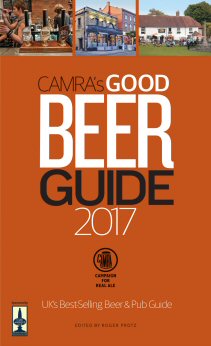
2017 Good Beer Guide (44th Edition!) Hop Press index
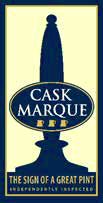
Beer quality assessor Cask Marque is sponsoring the 2017 Good Beer Guide. The fortyfourth edition of the Campaign for Real Ale’s (CAMRA) flagship pub guide was published in September and lists the best 4,500 pubs in the country − chosen entirely by its 180,000-plus members.
The book also, uniquely, lists the growing number of breweries in Britain; a list which continues to hit record levels.
Cask Marque’s Director, Paul Nunny, said: “The Good Beer Guide is dedicated to rewarding pubs for their excellent quality beer, their customer service and the overall atmosphere and benefits that each establishment brings to the consumer. As a leading pursuer of excellence in the cask ale industry, Cask Marque is delighted to once again be teaming up with CAMRA to support this publication which is essential reading for so many pub-goers.”
Good Beer Guide editor Roger Protz added: “Cask Marque has been striving for years to ensure Britain’s pubs meet the highest standards of beer quality and this has been an integral factor in rewarding so many Cask Marque-accredited pubs with an entry into the Guide.
“Cask Marque’s support of the Guide also illustrates that it remains vital reading matter for those seeking to find the perfect pint in their local area or in a place they may be visiting.”
The new edition is available now in all good bookshops or directly from CAMRA at: shop.camra.org.uk
Hop Press Issue number 81. Autumn 2016
Editor: Pat O'Neill
1 Surbiton Road
Eastleigh
Hants.
SO50 4HY
023 8064 2246
hop-press@shantscamra.org.uk
©CAMRA Ltd. 2016


|
© 2026 CAMRA Ltd. All rights reserved. Campaign for Real Ale, Southern Hampshire Branch Pages supplied by & updated by the Webmaster: Pete Horn [View Site Disclaimer, Personal Data Handing, and Cookie information] [Site History] |